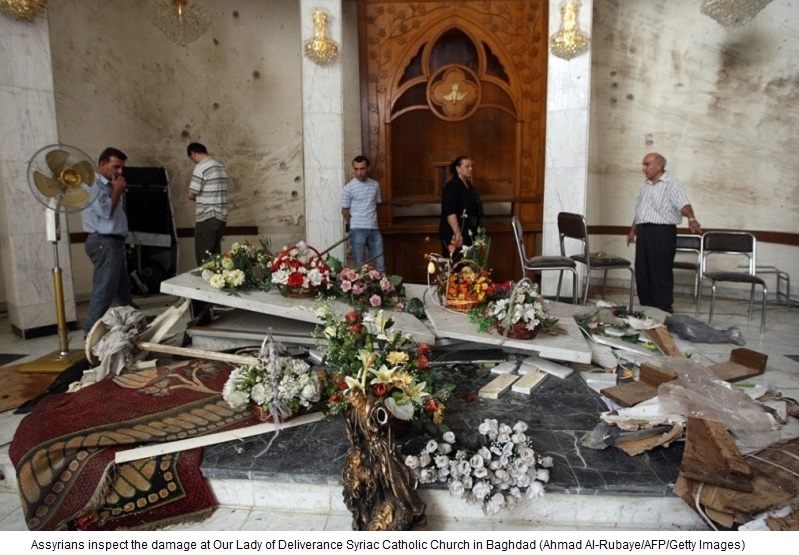


Adam wasn't having a tantrum. He wanted for his father to take him out of church. But he couldn't: His father had been killed by several gunshots.
"Kafi, kafi!" Adam kept screaming to the terrorists who entered the Syriac Catholic Church of Our lady of Deliverance Church Oct. 31, 2010, during the evening Sunday Mass. He wanted for it all to stop.
When his desperate mother couldn't quiet the child, a terrorist put a bullet between his eyes.
They left her alive: "We want you to suffer too," they told her and several other women who saw their families get killed during that bloody day.
Adam and his father, Auday Zuheer Marzina Arab, died, while his mother and younger brother, 11 months old at the time of the massacre, survived. In total, 48 people were killed that day.
Five terrorists from Iraq, Syria and Egypt, killed two priests and 45 lay Catholic faithful, one of whom was pregnant. The attack lasted over four hours, until the police raided the church. At this point, the terrorists blew themselves up. They were never officially identified.
Fathers Thaer Saadulla Abdal, 32, and Waseem Sabih Kas Boutros, 27, had been ordained in 2006 and 2007 respectively, in the same cathedral where they were martyred.
"Materially, the hundreds who were in the church could have died," said Argentinian Father Luis Escalante, who's serving as an assessor for the martyrdom cause of the 48 men and women killed that day, including the unborn child.
At a diocesan level, in Baghdad, the cause will officially be closed today, Oct. 31. Once in Rome, it's unknown how long it will take for the victims of the attack to be recognized by the Catholic Church as killed in odium fidei, meaning, in hatred of their faith.
Theirs won't be the only martyrdom cause of Iraqi Christians being studied by the Vatican's Congregation for the Causes of Saints. In August, and also with Escalante's help, two other causes were brought forth: Sister Cecilia Moshi Hanna, stabbed to death by Islamists in 2002, and Father Ragheed Aziz Ganni and his three companions, murdered in 2007.
Although traditionally when there is more than one martyr in a group they're often known by the name of the highest-ranking cleric killed - if there was one - and "companions," Escalante said he believes that it should be Adam who represents the Iraqi group killed in 2010.
"Adam is the leader of the group," Escalante told Crux earlier this month during a visit to Rome. "He's the best interpreter, because he understood everything that was happening, but at the same time, he understood nothing. Because no one can make sense of a terrorist attack."
Adam's mother, who's a witness in the martyrdom cause, is not strong enough to talk about it. Instead, she wrote what she remembers from that day, and mailed it from a western country where she's been living as a refugee since soon after the attack. Escalante, remembering some of what she wrote, defines her as someone who's both devastated by her loss but proud of her son.
"He said what so few today dare to say: Stop!" Escalante said.
Putting together the martyrdom cause for Rome is, according to the priest, like putting together a puzzle. The 48 lives were investigated in nine months, and Escalante is convinced that what they're presenting is the "best that could be done" - not due to a lack of time but because there's not much information on some of the victims.
"There are two victims of whom we only know their names and that they were there, killed for being at Mass," he said. "Everything that could be done, was done. But Baghdad lost two thirds of its Catholic population in the past two decades: They were either killed or were forced to flee and are currently living as refugees, many not wanting to or not being able to be identified."
The witnesses hail from all over: Lebanon, France, Canada, Australia, and also Baghdad. Most have since fled their country, one of the cradles of Christianity. Many of them said that the terrorists, when pulling the trigger or before activating the explosive belts they carried, shouted "Allahu Akbar," which translates to "God is great."
Archbishop Yousif Abba, the Syriac Catholic Archbishop of Bagdad, had contemplated only pursuing the sainthood cause for the two priests, as the Church had the information on them. But Escalante argued in favor of including the 48 in the cause, because in the end, "all died on the same day, for the same reason."
All of those who lost their lives did so in the church. Many were seriously wounded and hospitalized, but survived. An estimated 50 people had hidden in the sacristy with an elderly priest and the pregnant woman who had been mortally wounded before she reached the safety of the hiding place. A group of around 20 had found refuge in the baptistery. They too were saved.
In recent months, there's been a lot of buzz over a possible papal visit to Iraq next year, something Francis has stated he'd like to do. However, it all depends on the situation on the ground, which remains unstable. Despite the many challenges, Escalante said he hopes the pope will go, and that while he's there, he'll recognize the martyrdom that the people presented in the three causes.
"After everything they've been through in this short period - the fall of Saddam Hussein, the second American invasion, ISIS and the internal problems of the country - the community needs to revive their faith," he said. "The Christians who decide to remain are a small minority that continues to become smaller. They need help. They need to feel that they're not alone, and having their martyrs recognized as such would help.

or register to post a comment.